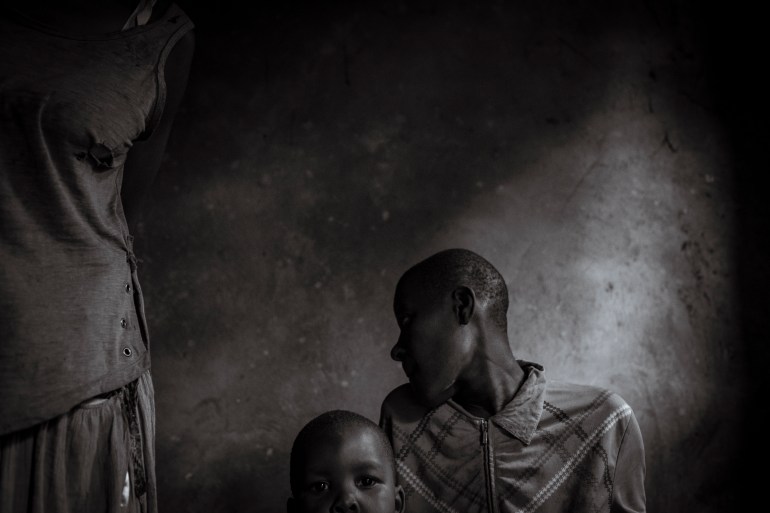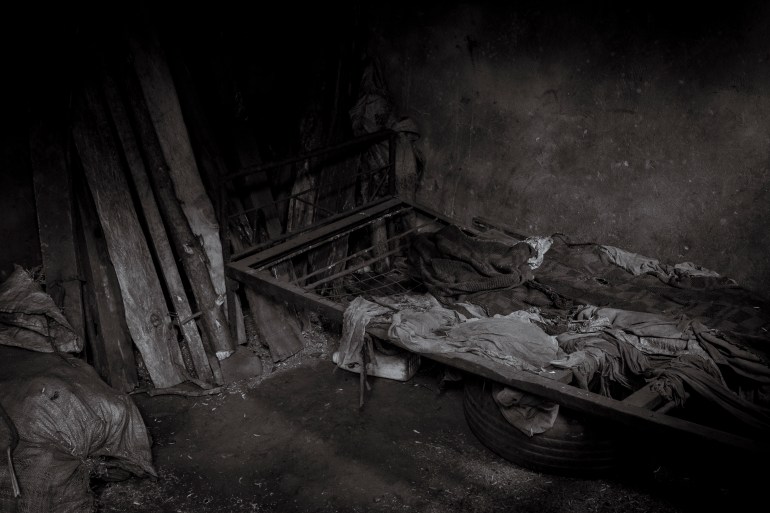‘I don’t want him to die this way’: Uganda’s hidden children
Tethered to beds or even trees, Uganda’s intellectually disabled children struggle under stigma and a lack of state care.
![Katherine Muwunguzi, 20, (right) sits with her mother, Joy Nangobi, and her son, Edwin [Christopher Hopkins/Al Jazeera]](/wp-content/uploads/2024/01/DSF3697-1701249253-1-1-1705996760.jpg?resize=1920%2C1080&quality=80)
Namazala, Jinja District, Uganda - The home of Joy Nangobi sits on the edge of Namazala village. Its front is open to the main road and thoroughfare that carries trucks loaded with sugar cane harvested from the fields surrounding it. Its back yard is small and fenced by the tall, dense cane. Two goats sit idle in the yard as three neighbourhood children play around them. Laundry hangs neatly drying over a wood stack beneath an overcast mid-morning sky.
From a small outside kitchen, Joy slowly tugs her 20-year-old daughter Katherine "Kat" Muwunguzi by the wrist across the hard clay, Kat’s knees grinding the sharp rocky earth to the storeroom she now sleeps in.
The walls are covered in a thin layer of red dust, the floor scattered with wood chips beneath a steel bed rusted and lacking a mattress. A filthy, tattered blanket is the only barrier between Kat’s lithe body, the cold night air and malaria.
Joy wrenches Kat up to the bed’s edge, her arms and head flailing. Kat’s legs are twisted unnaturally beneath her as she sits on its edge, her smile childlike as she puts her hand inside her mouth. She is instructed not to move and Joy leaves the room and shuts the door behind her, to resume cooking the midday meal.

Kat lives with an intellectual disability and what is assumed by her mother to be epilepsy.
Her intellectual disability has never formally been diagnosed, she can’t talk and is prone to acts of violence.
“When we went to a government facility [hospital], that was when they told us she has mental issues and to go away.” Joy’s despair is clear as she explains through an interpreter: “At one point when in the process of taking her to the hospital she would bite my husband seriously. At one point, he was even forced to throw her after a strong bite.”
The stigma of people with intellectual disabilities is fuelled by a cultural belief that they are 'cursed'
Kat has a four-year-old son, Edwin, though she isn’t aware that she is the boy's mother. When Kat began to show at seven months and she was confirmed to be carrying Edwin, their next-door neighbour disappeared. Joy and her husband Robert Balina, workers on the sugar cane plantations, suspect their next-door neighbour raped Kat in the sooty outdoor kitchen while they slept inside. He has never been charged.
This family dynamic means that Joy raises Edwin, but not as her own. She is determined to teach Edwin that Kat is his mother.

“We are trying our level best to try and create a relationship between the child and his mother, but she doesn’t have anything that she cares about given her mental situation.
“We always tell this child [Edwin] that no matter the condition of your mother, she is your mother. Every time we try to ask him, just to find out, if he remembers who his mother is, and if you ask him, he says - ‘the one who is mentally disturbed is my mother’.”
Kat is among an estimated one in four adults with a psychosocial or intellectual disability in Uganda to have been the victim of sexual assault. But rape is only one of a raft of human rights abuses this minority face due to their vulnerability.
The stigma of people with intellectual disabilities is fuelled by a cultural belief that they are "cursed".
Restrictive practices such as restraint, tethering and forced seclusion are common. In Uganda, people living with psychosocial or intellectual disabilities are often considered a burden on society.
While NGOs and local experts in the field of intellectual disability cite a lack of education and awareness as being the major hurdles to overcoming the cultural taboo around such disabilities within communities, they also say the government has failed to prioritise funding.
But a small corner of society has taken up the challenge and is providing a sliver of hope to those like Joy and Kat.